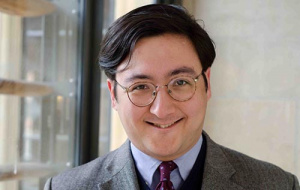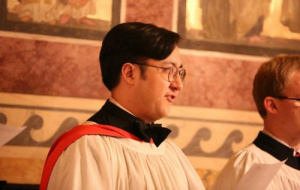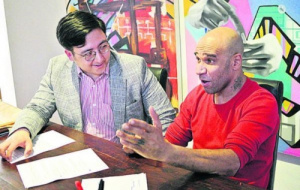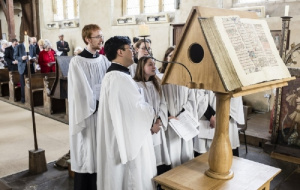Profile: Dr Matthew Cheung Salisbury

Dr Matthew Cheung Salisbury, Director of Studies and Lecturer in Music
Dr Matthew Cheung Salisbury is interested in the late medieval and present-day practice of Christian worship and its music, and has published a number of books, most recently Worship in Medieval England (2018), alongside critical editions of text and music and an edited volume on worshipping alongside people with dementia (God in Fragments, 2020). He has taught across various aspects of the Music course including an option paper on music and theology.
Why did you become an academic?
I have always been excited about learning new things and, in particular, collecting ideas and information. As an undergraduate, I had the opportunity to work with medieval manuscripts whose contents had been largely overlooked, and that experience, fostered by one of my tutors, took me on a fairly direct route to where I am now. I am still working with those manuscripts. I also had other inspiring teachers who offered encouragement, and I try in my own teaching to share the enthusiasm for study that they shared with me.
 How has your research and teaching changed during lockdown?
How has your research and teaching changed during lockdown?
The shift to online teaching has meant we have needed to think about ways of doing things differently, but I think the format of the tutorial, more than other kinds of learning, has made the transition quite successfully. It’s wonderful in this generation that students have access to so many online resources.
My own writing and research on manuscripts has been rather impeded by the closure of libraries, but I have kept busy with a lot of policy work relating to the pandemic and its effects on church services and church music.
Have you faced any challenges in your life that you are happy to share here? If so, how did you cope with them?
It’s never nice to be rejected from things, but it’s an inevitable part of academic life, whether from jobs, grant applications, publications… it doesn’t necessarily get easier. But life goes on, and as the song goes, you must “pick yourself up, dust yourself off, and start all over again.”

Dr Matthew Cheung Salisbury working with Goldie on the Fragments project
You are Assistant Chaplain at Worcester College’s Chapel as well as being the National Liturgy and Worship Adviser to the Church of England. What role does the Church play in your life?
I think it’s fair to say that I’d be living a very different life if I had not had the opportunity to be engaged in church music from an early stage. The practice of church music has given me a personal faith and a subject for specialist teaching and research. It has also given me the rare opportunity (for someone trained as a medievalist) for my expertise to have a real effect on the policy and practice of the Church as it exists in the present day. There are some unexpected but important areas of connection, including the often mentioned but rarely interrogated concept of active participation in worship.
 Do you have any favourite/funny moments from your time at Univ?
Do you have any favourite/funny moments from your time at Univ?
a) Because of the frenetic itinerary of a trip to study manuscripts, I was interviewed for my post at Univ by telephone, sitting on a sofa in a flat in the monastery of Santo Domingo de Silos in northern Spain. Owing to the time difference, I accidentally ‘arrived’ at interview an hour early.
b) The Librarian, Elizabeth Adams, and I once removed a medieval manuscript from the Bodleian (with permission) and carried it back to Univ in a Tesco bag to avoid being conspicuous.
c) After a series of tutorials looking at some sixteenth-century choral music, some students and I (all singers) decided to spend a morning singing through a great deal of it. There ought to be more connections between academic study and praxis in the Music course!
Describe Univ in three words.
An inspiring environment.
Published: 1 March 2021
